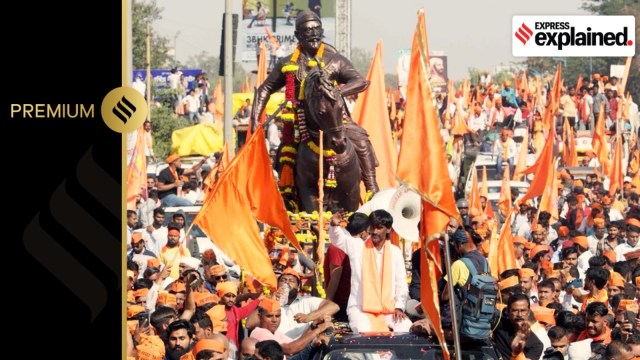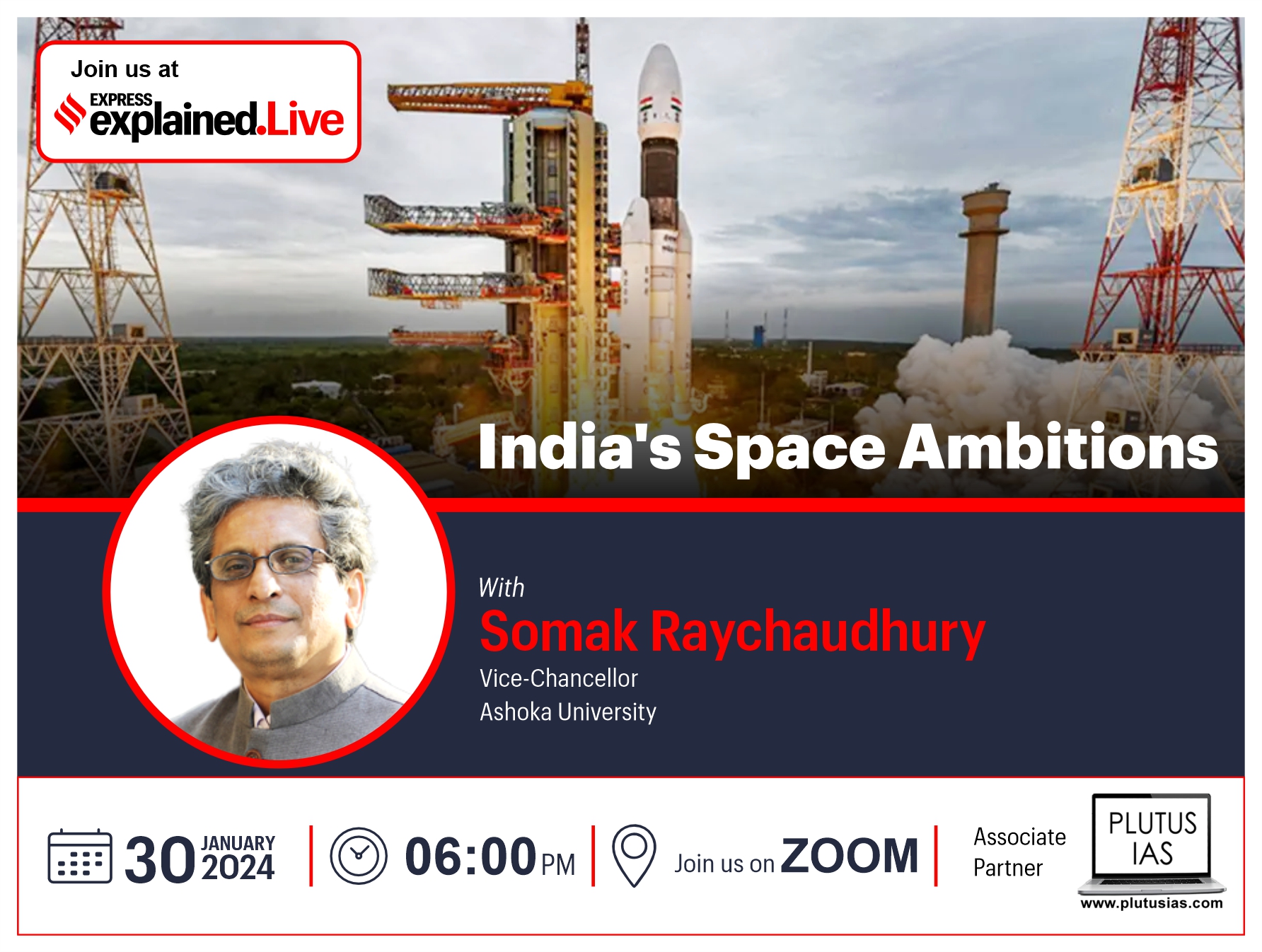As Maharashtra CM assures quota to Marathas, why OBCs are planning to take to streets and courts
While the proposed formulation does not tinker with the 50 per cent limit set by the Supreme Court, it allows Marathas to claim reservation under the 27 per cent set aside for OBCs.
 Manoj Jarange Patil's rally from Antarwali Sarati in Jalna, Maharashtra, heading to Mumbai for the demand of Maratha reservation. (Express Photo By Pavan Khengre)
Manoj Jarange Patil's rally from Antarwali Sarati in Jalna, Maharashtra, heading to Mumbai for the demand of Maratha reservation. (Express Photo By Pavan Khengre)Even as the Maratha community awaits the finalisation of rules on Maratha reservation, the communities under Other Backward Class (OBC) fear a shrinking of their 27 per cent reservation pie and are ready to take the battle to the street and the courts.
While the proposed formulation does not tinker with the 50 per cent limit set by the Supreme Court, it allows Marathas to claim reservation under the 27 per cent set aside for OBCs. So there will be more claimants not just for government jobs and educational institutions reserved for OBCs, but also for OBC-reserved seats in local civic bodies.
Kunbis are farmers, and most of them in Vidarbha and northern Maharashtra have Kunbi certificates and OBC status. But many from the Maratha community in Marathwada and western Maharashtra do not have Kunbi certificates, and hence are not entitled to OBC reservation. While Marathas are estimated to account for 32 per cent of the state’s population as per the Narayan Rane committee appointed by the Congress-NCP government in 2013, there are no estimates of Kunbi or Kunbi-Marathas in the state.
It will be at least another fortnight before the state notifies the rules, having called for suggestions and objections from all stakeholders till February 16.
While Chief Minister Eknath Shinde already claimed Saturday that he has fulfilled his oath taken before Chhatrapati Shivaji Maharaj — of giving reservations to Marathas, his deputy was more nuanced, and still some others have called a meeting of OBCs Sunday to decide their future course of action.
After the morning truce with activist Manoj Jarange-Patil, Deputy Chief Minister Devendra Fadnavis clarified that only the process of giving Kunbi certificates to those with records and pieces of evidence has been eased, and there is no question of bringing those without certificates under the OBC category.
NCP Minister in Maharashtra and senior OBC leader Chhagan Bhujbal has, meanwhile, called a meeting of OBC leaders, intellectuals and activists on Sunday to finalise the strategy ahead. The aggrieved OBC outfits and their leaders are likely to challenge the government’s decision in the High Court or Supreme Court going forward.
OBC groups in the state are not against granting separate reservation to Marathas through the Socially and Educationally Backward Classes (SEBC) Act, but are opposed to sharing quota benefits from the reservation pie allotted to them. The OBC Mahasangh had warned the state government of serious consequences if it agreed to Marathas reservation under the OBC category.
“It is a betrayal of OBC trust. The state government had repeatedly assured us they will not take any decision that would open doors for Marathas to avail OBC reservation using Kunbi certificates. Now, a draft notification has done exactly the opposite. The notification states all the sage-soyare (blood relations) of the individual who has verified Kunbi records belonging to the Maratha community will be entitled to Kunbi certificate. This means those with Kunbi records along with their relations will be entitled to Kunbi certificates. Using these Kunbi certificates they will claim rights to OBC reservation,” OBC Jan Morcha President and MLA Prakash Shendge told The Indian Express.
“We are going to fight on many fronts. We will take the battle to courts. We will hold public rallies. We will fight on the streets to protect the OBC quota. We will have to use all available methods to assert ourselves,” Shendge said.
Sensing the unrest within the OBC community, Fadnavis was quick to react and said OBCs would not face injustice. “I want to clarify that the government’s decision is not against OBCs. The issue was about solving problems in getting certificates for those with records and evidence. It was not about giving certificates to those without records and evidence. The government has only simplified the process,” Deputy CM Fadnavis said.
A key concern for the OBCs is about the curtailment of political representation in local civic bodies. In a political system, where Marathas already dominate the space, their inclusion as Kunbis will lead to them staking claim on OBC reserved seats in local civic bodies. OBCs have been saying that the Marathas should be given separate reservation instead of reducing theirs. The political ramifications of the OBC unrest are likely to play out during the upcoming general elections.
 Join us for Explained Live event on India’s space ambition
Join us for Explained Live event on India’s space ambition
In 2018, the then Fadnavis-led government enacted the Maharashtra State Reservation for Socially and Educationally Backward Classes (SEBC) Act which granted 16 per cent reservation to Marathas in government jobs and education. In June 2019, the Bombay High Court upheld the SEBC Act but ruled that the 16 per cent quota was not “justifiable”. It reduced the quota to 12 per cent in education and 13 per cent in government jobs, as recommended by the Maharashtra State Backward Class Commission (MSBCC). The High Court also said that total reservations should not exceed 50%, except in “exceptional circumstances and extraordinary situations”.
However, in 2021, a five-judge Constitution Bench of the Supreme Court struck down the SEBC Act, noting that ‘no extraordinary circumstances were made out granting separate reservation… by exceeding the 50 per cent ceiling limit of reservation … ” set by the 1992 Indra Sawhney (Mandal) judgment.” After Maharashtra government’s review petition got rejected by SC, the state filed a curative petition, which is pending before the Apex Court.
With SC striking down SEBC Act, as on date, the existing total reservation at present is 52 per cent.
While the Shinde-led Sena was quick to claim credit and organise celebrations, the Nationalist Congress Party (NCP) led by deputy Ajit Pawar issued a statement on social media website X, where it congratulated the Maratha community. Both Fadnavis and Pawar were absent when Shinde handed over the draft notification to Manoj Jarange-Patil. It resulted in Shinde claiming the credit of solving the issue of Maratha reservation despite the Maratha heavyweight like Ajit Pawar in the cabinet.
The Opposition in Maharashtra said the government has deceived both Marathas and OBCs. Maharashtra Congress chief Nana Patole pointed out that the government has not fulfilled the promise of giving Kunbi certificates to the entire Maratha community. “And if reservation is given from the OBC quota, that means the promise of not violating the OBC quota is not being fulfilled. In a way this government has cheated both,” he said. While Maharashtra Navnirman Sena (MNS) chief Raj Thackeray congratulated the community, it taunted by asking the community to now ask the Chief Minister as to when will he give the reservation.
Sources within the opposition pointed out that the community will now have to wait till February 16 for the implementation of the notification and that is going to be challenged in the court. “The model code of conduct for the general elections will be applied by then and the entire issue will take a backseat. But with support that Jarange-Patil has gathered in Marathwada and his emotional connect, it is better that none of us point out to these lacunae,” a senior leader from the opposition said.



- 01
- 02
- 03
- 04
- 05



































